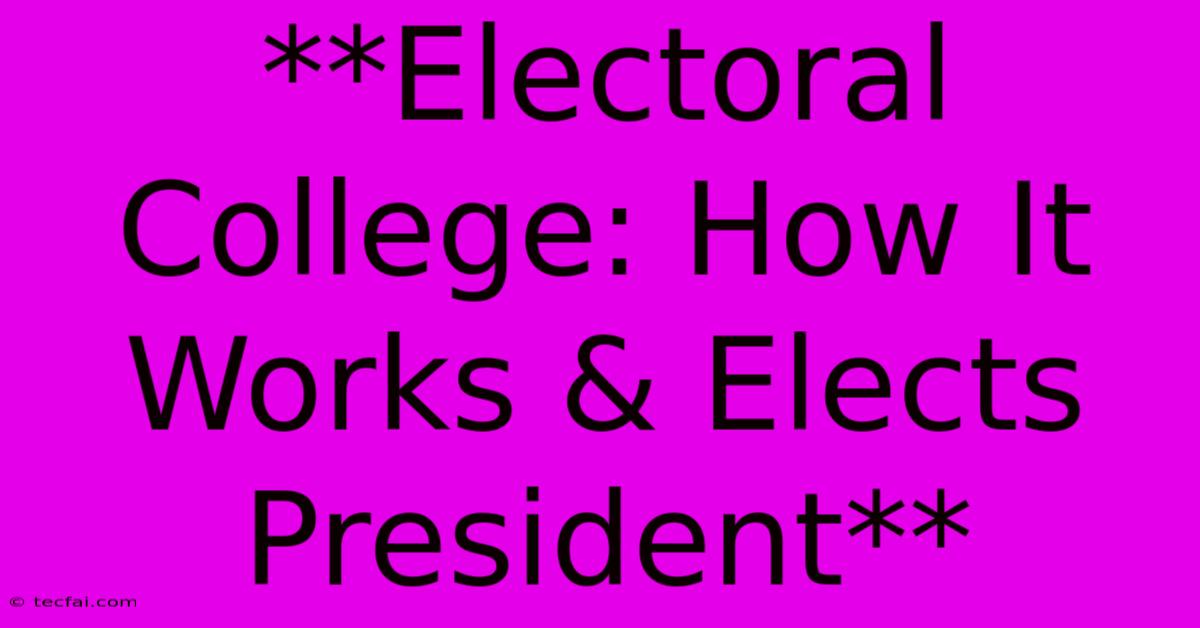**Electoral College: How It Works & Elects President**

Discover more detailed and exciting information on our website. Click the link below to start your adventure: Visit Best Website tecfai.com. Don't miss out!
Table of Contents
Electoral College: How It Works & Elects President
The United States Presidential election is a complex process, and understanding the Electoral College is key to grasping its intricacies. While the popular vote counts, it's the Electoral College that ultimately determines the President of the United States. This article will delve into the workings of the Electoral College, explaining its structure, how it elects the President, and the ongoing debate surrounding its relevance in modern times.
Understanding the Electoral College
The Electoral College is a body of electors established by the United States Constitution, constituted every four years for the sole purpose of electing the President and Vice President. It's a system that assigns a specific number of electors to each state based on its total population.
Here's how it breaks down:
- Each state's number of electors is equal to the number of representatives it has in the House of Representatives plus its two Senators. For example, California has 55 electoral votes because it has 53 representatives in the House and two Senators.
- The District of Columbia (D.C.) has three electors. This was granted by the 23rd Amendment to the Constitution.
- The total number of electors is 538. This represents the total number of Senators (100), Representatives (435), and electors for D.C. (3).
The Election Process
- Popular Vote: During the Presidential election, citizens vote for the candidate they prefer. These are known as the popular votes.
- Electoral Vote Allocation: The candidate who receives the most popular votes in a state typically wins all of that state's electoral votes (except in Maine and Nebraska, which use a proportional system).
- Reaching the Magic Number: A candidate needs to secure a minimum of 270 electoral votes (more than half of the 538 total) to become President.
- The Electoral College Vote: Once the popular vote is tallied, the electors cast their votes for President and Vice President. These votes are officially counted by Congress in a joint session on January 6th of the year following the election.
The Debate Surrounding the Electoral College
The Electoral College has been a subject of intense debate since its inception. Some argue it’s an outdated system that distorts the will of the people, while others maintain it’s a vital safeguard for smaller states and prevents candidates from focusing solely on densely populated urban areas.
Here are some of the key arguments:
Arguments for:
- Protects Smaller States: The Electoral College ensures that smaller states have a voice in the election. Without it, candidates would focus exclusively on large states with higher populations.
- Guarantees National Representation: The Electoral College compels candidates to appeal to a wider range of voters across the country, promoting national unity and preventing regional dominance.
Arguments Against:
- Distorts the Popular Vote: A candidate can win the presidency even if they lose the popular vote. This has happened five times in US history, most recently in 2016.
- Reduces Voter Engagement: Critics argue that the Electoral College system discourages people in states that are considered "safe" for a particular party from voting, as their vote may not have a direct impact on the outcome.
- Contributes to Polarization: The focus on swing states and the "winner-take-all" system in most states can exacerbate political polarization, as candidates may be more likely to cater to the extremes within those states.
Conclusion
The Electoral College remains a complex and controversial element of the US Presidential election system. Its future remains a subject of debate, with arguments both for and against its continued relevance. The system has evolved over time, and its future will depend on how effectively it balances the concerns of smaller states and the desire for a more representative and democratic election process.

Thank you for visiting our website wich cover about **Electoral College: How It Works & Elects President**. We hope the information provided has been useful to you. Feel free to contact us if you have any questions or need further assistance. See you next time and dont miss to bookmark.
Featured Posts
-
Williams Appearance Raises Health Questions
Nov 06, 2024
-
Djt Stock Volatility Precedes Election
Nov 06, 2024
-
Melania Trump Voting Confusion Online
Nov 06, 2024
-
Kat Mc Guffie Steps Down From Abc Role
Nov 06, 2024
-
Tom Grennan Great Ormond Street Light Up Oxford Street
Nov 06, 2024
